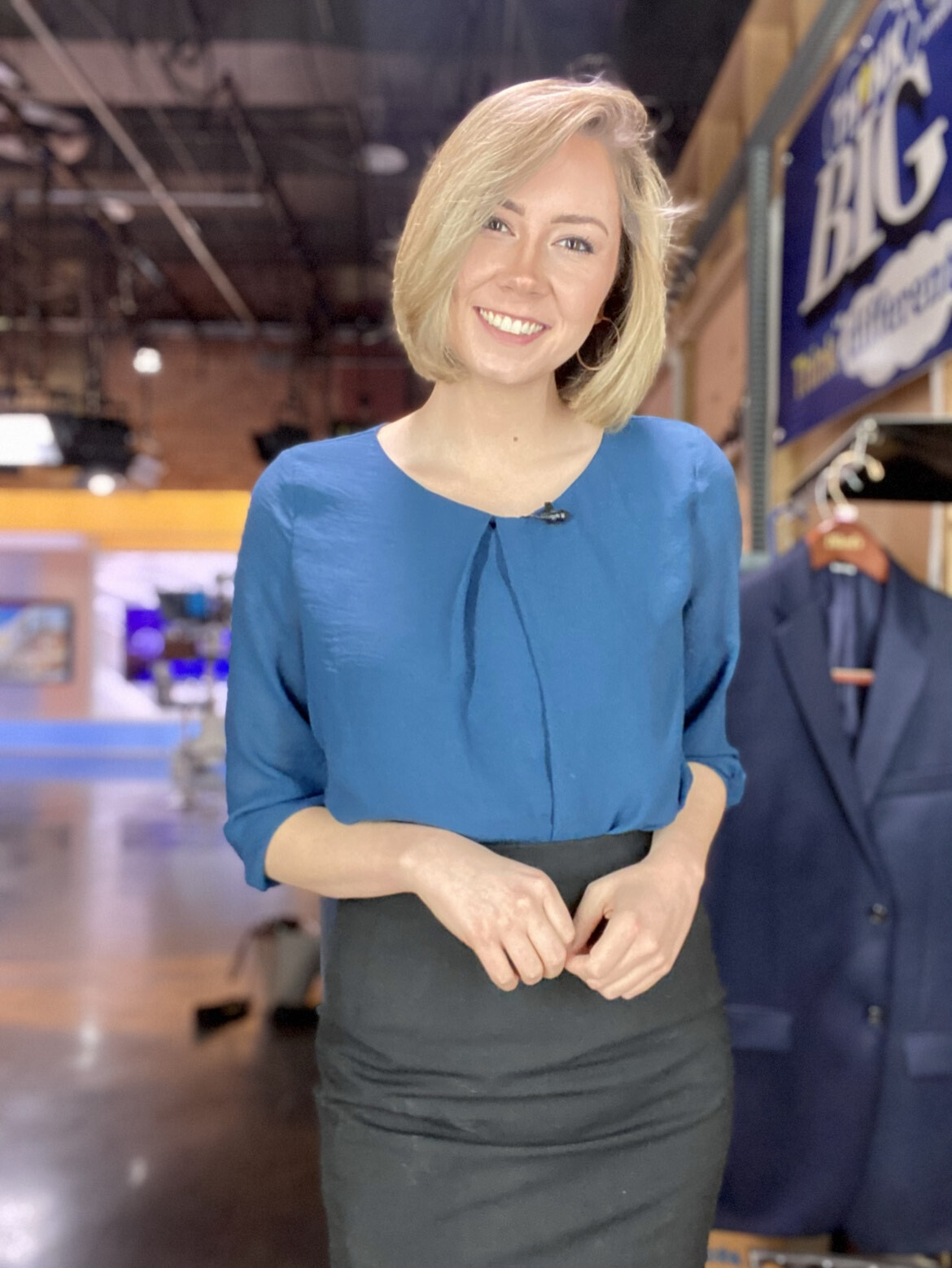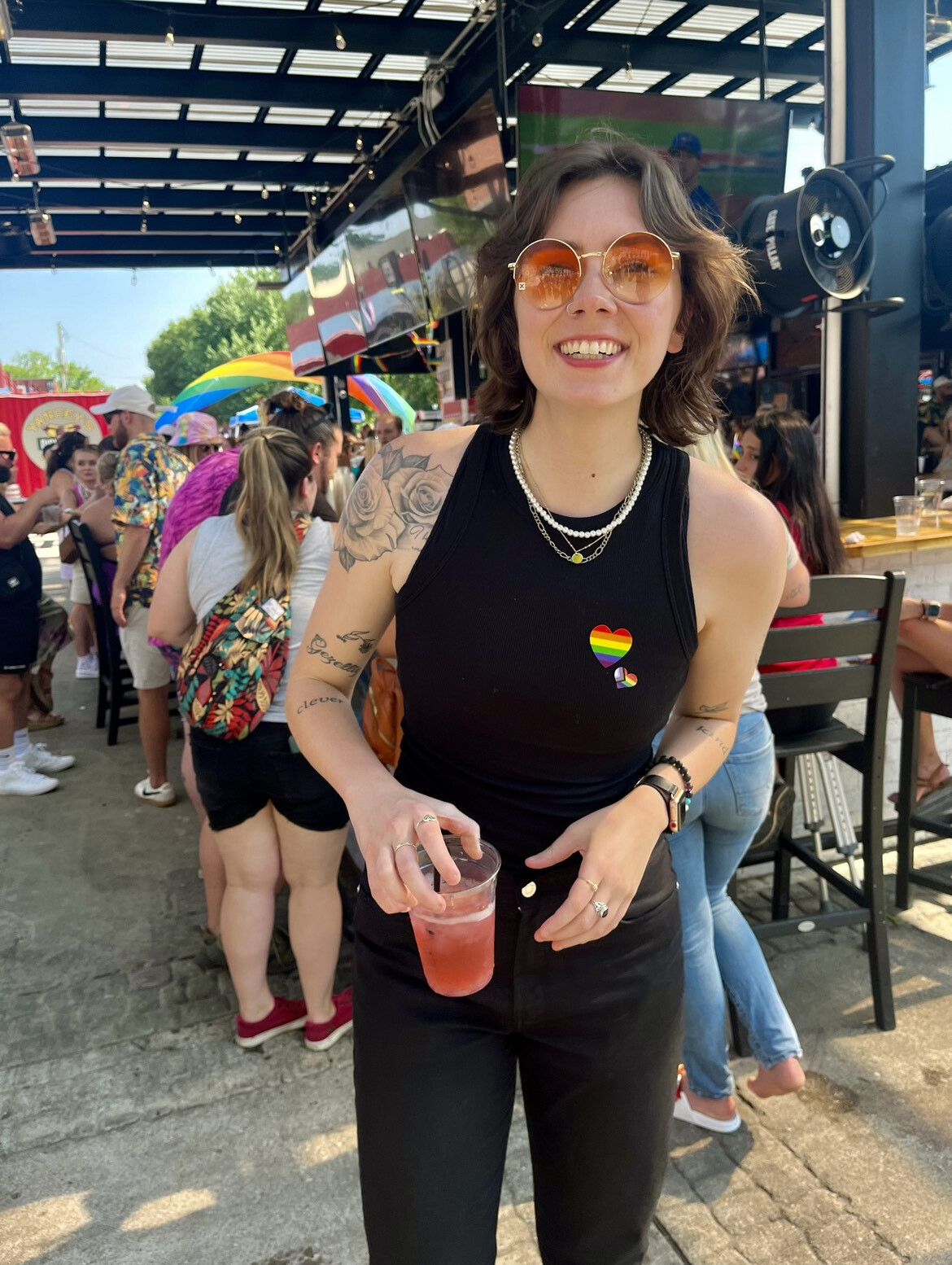
Dallas reporter Dianté Marigny got her first tattoos more than 10 years ago — a pair of fleurs-de-lis — before she considered a career in journalism. Since then, she has accumulated nine more tattoos. She said her on-air career hasn’t stopped her, even getting a floral globe on her neck a year into her anchoring career.
“I just have such a special love for tattoos and how artistic they can be,” said Marigny, 30, who works at an ABC affiliate station.
However, Marigny knew she couldn’t show them on air. “I was like, ‘I’m just going to go for it,’” she said. “‘I really, really want this tattoo. It makes me happy, and I’ll just do what I have to do to cover it up,’” she said.
On-camera anchors have been expected to have a particular look — a well-maintained hairstyle, a professional business wardrobe and unblemished skin. While on-air hair norms are slowly being broken (at least in some markets) and women anchors have seen styles go from suits to sheath dresses to more personalized business casual, tattoos overwhelmingly remain a no-no.
Tattoos may be more acceptable in print and digital newsrooms, but some broadcast stations still have explicit policies against on-air talent showing tattoos. Many others have more of an unspoken expectation for reporters to look ink-free as soon as the camera rolls.
“One tension for stations is the demographic that watches broadcast news,” said Andy Burns, an instructor at the School of Journalism and Mass Communications at the University of South Carolina. “The demographics trend older.”
Adults ages 55 to 64 account for more news viewership than any other age demographic, according to a 2022 report from Nielsen Media Research. However, Burns believes cultural expectations will change as young people age, demographics shift and streaming news grows in popularity.
“If there are cool graphics and good storytelling, I don’t think [young viewers] care if the reporter has a scruffy beard and an earring,” he said.
Why broadcast news is slow to change
Although news stations are slow to welcome tattoos, tattoos have become more accepted nationwide. According to a Pew Research Center survey published in August, 32% of adults have a tattoo, including 22% who have more than one — a majority of whom are under 50. Companies are also embracing policies that allow workers to show tattoos. Major corporations like Disney and UPS relaxed their style policies for employees since 2020, which includes visible tattoos, CNBC reported.
“Nothing happens in a vacuum,” Burns said. “Change is always in reference to what’s going on during that particular era. Social media and the internet have changed those rules so much faster than before.”
Marigny said she understands why news stations are slow to accept tattoos, even though she doesn’t believe it’s a big deal.
“They just want to be safe. I think they believe they’ll lose viewers because someone is showing their tattoos,” she said. “But viewers will stop watching for any number of reasons, like how we deliver the news, what clothes we wear, how we do our hair.”
Those concerns don’t necessarily translate to public perception either. The Pew survey also found that 66% of untattooed adults are indifferent to seeing tattoos on others.
To destigmatize tattoos in broadcast journalism, Marigny shares videos on Instagram about how she covers her tattoos with makeup before going on air. “It lets people know that just because you have tattoos — it doesn’t mean you’re limited in any job, in any career,” she said.
Pushing back against on-air appearance norms
Viktoria Capek’s experience in journalism was much different than Marigny’s. Once an anchor in Little Rock, Arkansas, Capek said being punished for showing her tattoo on air was part of the reason she left the industry.


Capek had several small visible tattoos when she was hired at ABC affiliate KATV. Even though she had signed a contract stating she couldn’t significantly alter her appearance, she said she felt “encouraged” when she told her news director she was getting a larger piece on her shoulder. “He was like, ‘That’s awesome, girl! You know I love stuff like that!’” she said.
After getting her tattoo, Capek wanted to show it off during the morning newscast, especially since she had positive reactions from seasoned reporters when she floated the idea at the station. “I did the show with my tattoo showing, and I felt so confident,” she said. Afterward, she said, her news director told her she had to cover her tattoo going forward. (KATV did not respond to NBCU Academy’s request for comment.)
“I didn’t think it was going to be a problem,” Capek said. “Everyone was giving the green light. So, I was feeling a little confused by this.” She said the news managers told her they had received three messages on social media criticizing her tattoos, which led to the news director’s decision.
She posted a video on TikTok sharing her experience while covering up in a blazer, which garnered over 550,000 views and 140,000 likes. Capek said she received positive comments and emails about how important it was to be true to herself and her style.
She said she decided to push boundaries during a newscast when she only covered her tattoo halfway. This — along with making TikToks about her life as an anchor — got her suspended, she said. She was also asked to sign a document agreeing to cover her tattoo completely while on air.
She said she was surprised and disappointed by the station’s decision to suspend her. She stayed until the end of her contract but left soon after it was up.
Now a freelance digital marketing manager, Capek believes that news stations slow to change will ultimately hinder the success of young people in the industry. The Pew survey found that 41% of adults ages 18 to 29 have at least one tattoo, with the majority having two or more.
“Young people deserve not just a seat at the table but also a voice,” she said. “Isn’t that what journalism is all about? I think that young people are, more than almost any other group, left out of bringing people into diversifying organizations.”
She emphasized that while tattoos are not the same as skin color, hair texture or race, they often hold cultural and personal meaning. For example, Oriini Kaipara, a New Zealand news anchor, went viral in 2021 after becoming the first person with Māori face markings — called moko kauae — to anchor national news in primetime.
“There are large communities, specifically young people, who have tattoos, and it’s a very important part of self-identity,” Capek said. “There are a lot of times that tattoos are significant to people’s cultures or families.”
Balancing identity and career
Not all on-air reporters think their tattoos are worth the hassle. Lauren Barnas, an on-air anchor in Springfield, Missouri, has been documenting her laser tattoo removal sessions on TikTok.
“I think they’re beautiful, but just not my personal aesthetic, and I have to cover them every day for work,” the CBS News-affiliated journalist said in a video on TikTok. (Barnas declined NBCU Academy’s request for an interview.)
Barnas, who has over 275,000 followers on the platform, said she wanted to expand her closet to include sleeveless dresses and outfits without raising potential issues from management or viewers.
“No one has really actually told me that I can’t show my tattoos on air, but I’ve always worked in such conservative markets that I don’t even — even if I got manager approval, I don’t even want to deal with what viewers would have to say, which is sad but it’s the truth,” she said in another video.
Marigny, meanwhile, is planning for an 11th tattoo. She is hopeful that one day soon, tattoos won’t be a big deal in broadcast news.
“I think the narrative is shifting,” she said. “I think in five or 10 years, we probably won’t be having this conversation. Tattoos will be more widely accepted.”


